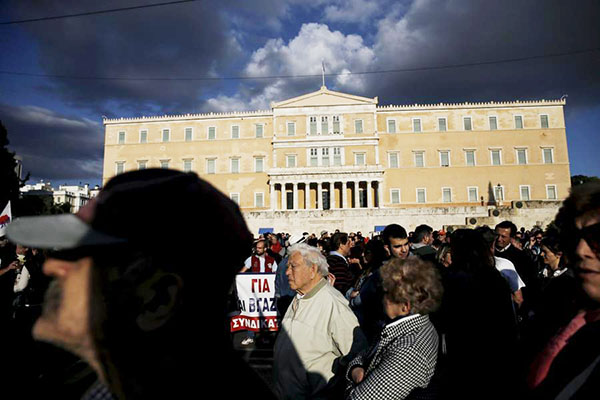 |
|
Protesters from the Communist-affiliated trade union PAME take part in a demonstration against unemployment in front of the parliament building in Athens, Greece April 10, 2016. [Photo/Agencies] |
ATHENS - While Greece's government trumpeted a debt relief deal with other euro zone countries on Wednesday as the beginning of the end of its bruising six-year financial crisis, many Greeks remained unconvinced.
After years of austerity measures demanded by Greece's international creditors - the latest passed in parliament last Sunday - Greeks wonder whether the sacrifices they have made to stay in the euro were worth the pain.
"We are done, we can't even leave our homes anymore to have a coffee," said Panagiotis Zabetakis, 50, a carpenter who, like one in every four Greeks, is unemployed.
Playing with worry beads at a cheap cafe in an Athens suburb, Zabetakis paid 1 euro ($1.10) for his morning coffee. That will rise on June 1 when the measures passed to secure Wednesday's deal start coming into force.
By next year Greeks will pay an extra 20-30 cents for their coffee and the price of just about everything else will rise too as added tax will (VAT) goes up to 24 percent from 23 percent. Greeks' spending power, meanwhile, is in sharp decline.
"We are running after the Europeans, hoping they throw us a bone which would suffice for a few months. I'm very disappointed," Zabetakis said, criticising the deal which opens the way for debt relief from 2018, but does not include any firm promise to reduce the payments Greece has to make.
VORTEX OF AUSTERITY
Greece have been hit with waves of pension cuts and tax increases since it was forced to seek its first bailout in 2010.
Leaving the meeting in Brussels where he secured 10.3 billion euros ($11.5 billion) in new funds from his euro zone colleagues, Finance Minister Euclid Tsakalotos said he hoped the deal marked "the beginning of turning Greece's vicious circle of recession-measures-recession into one where investors have a clear runway to invest in Greece."
The deal won a provisional commitment from the IMF to return to the bailout process, but with Germany opposed to cutting the debt pile, euro zone ministers made any relief measures such as extending maturities on loans contingent on Athens respecting strict criteria, something Greeks fear means more austerity.
"This cannot continue ... they (the Europeans) are telling us we will be in debt for 100 years. How can we be pleased?" asked pensioner Eleni Palaiologou, 85.
Prime Minister Alexis Tsipras, elected in early 2015 on a promise to end austerity only to row back and accept a new bailout to avoid being forced out of the euro, struggled to get his coalition to accept the latest reforms.
Scraping through with a narrow majority of 153 members in the 300 seat parliament, there is some stirring dissent. One of Tsipras' lawmakers quit after Sunday's vote.
"We are adopting measures and policies which run counter to the core of our values and policies," the resigned member of parliament, Vassiliki Katrivanou, said on her Facebook page. "But I cannot think of any credible alternative."
On the streets of Athens, a 33-year-old chartered accountant, who declined to give his name fearing repercussions at work, said he was tired of scraping by.
"I feel we are just living in this vortex of austerity measures," he said. "It's a constant of just sacrifices."